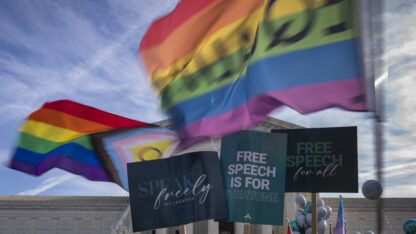The Supreme Court is hearing the case Monday of a Christian graphic artist who objects to designing wedding websites for gay couples, a dispute that’s the latest clash of religion and gay rights to land at the highest court.
The designer and her supporters say that ruling against her would force artists — from painters and photographers to writers and musicians — to do work that is against their faith. Her opponents, meanwhile, say that if she wins, a range of businesses will be able to discriminate, refusing to serve Black customers, Jewish or Muslim people, interracial or interfaith couples or immigrants, among others.
The case comes at a time when the court is dominated 6-3 by conservatives and following a series of cases in which the justices have sided with religious plaintiffs. It also comes as, across the street from the court, lawmakers in Congress are finalizing a landmark bill protecting same-sex marriage.
The bill, which also protects interracial marriage, steadily gained momentum following the high court’s decision earlier this year to end constitutional protections for abortion. That decision to overturn the 1973 Roe v. Wade case prompted questions about whether the court — now that it is more conservative — might also overturn its 2015 decision declaring a nationwide right to same-sex marriage. Justice Clarence Thomas explicitly said that decision should also be reconsidered.
The case being argued before the high court Monday involves Lorie Smith, a graphic artist and website designer in Colorado who wants to begin offering wedding websites. Smith says her Christian faith prevents her from creating websites celebrating same-sex marriages. But that could get her in trouble with state law. Colorado, like most other states, has what’s called a public accommodation law that says if Smith offers wedding websites to the public, she must provide them to all customers. Businesses that violate the law can be fined, among other things.









